罗马希腊文学
- 格式:doc
- 大小:35.50 KB
- 文档页数:3
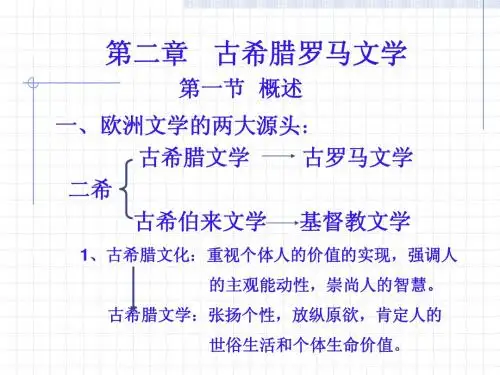
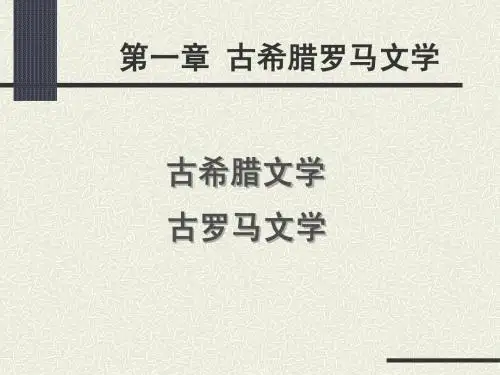
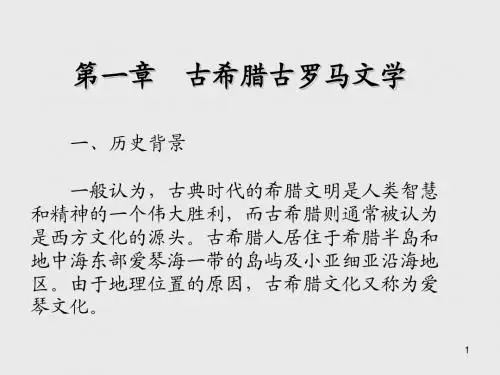
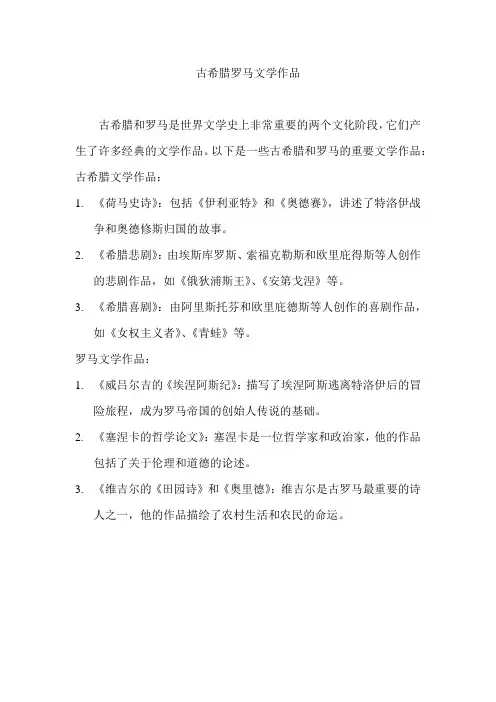
古希腊罗马文学作品
古希腊和罗马是世界文学史上非常重要的两个文化阶段,它们产生了许多经典的文学作品。
以下是一些古希腊和罗马的重要文学作品:古希腊文学作品:
1.《荷马史诗》:包括《伊利亚特》和《奥德赛》,讲述了特洛伊战
争和奥德修斯归国的故事。
2.《希腊悲剧》:由埃斯库罗斯、索福克勒斯和欧里庇得斯等人创作
的悲剧作品,如《俄狄浦斯王》、《安第戈涅》等。
3.《希腊喜剧》:由阿里斯托芬和欧里庇德斯等人创作的喜剧作品,
如《女权主义者》、《青蛙》等。
罗马文学作品:
1.《威吕尔吉的《埃涅阿斯纪》:描写了埃涅阿斯逃离特洛伊后的冒
险旅程,成为罗马帝国的创始人传说的基础。
2.《塞涅卡的哲学论文》:塞涅卡是一位哲学家和政治家,他的作品
包括了关于伦理和道德的论述。
3.《维吉尔的《田园诗》和《奥里德》:维吉尔是古罗马最重要的诗
人之一,他的作品描绘了农村生活和农民的命运。
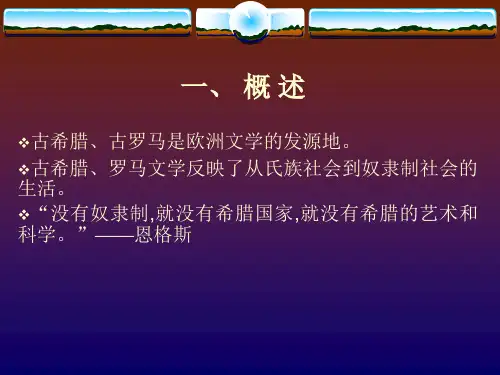

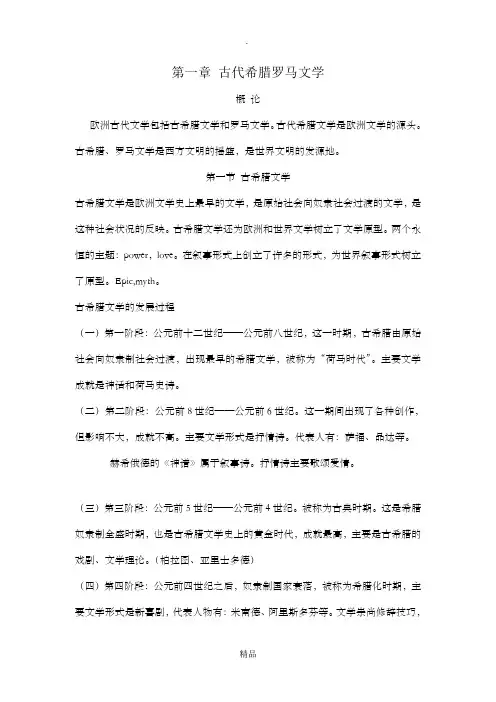
第一章古代希腊罗马文学概论欧洲古代文学包括古希腊文学和罗马文学。
古代希腊文学是欧洲文学的源头。
古希腊、罗马文学是西方文明的摇篮,是世界文明的发源地。
第一节古希腊文学古希腊文学是欧洲文学史上最早的文学,是原始社会向奴隶社会过渡的文学,是这种社会状况的反映。
古希腊文学还为欧洲和世界文学树立了文学原型。
两个永恒的主题:power,love。
在叙事形式上创立了许多的形式,为世界叙事形式树立了原型。
Epic,myth。
古希腊文学的发展过程(一)第一阶段:公元前十二世纪——公元前八世纪,这一时期,古希腊由原始社会向奴隶制社会过渡,出现最早的希腊文学,被称为“荷马时代”。
主要文学成就是神话和荷马史诗。
(二)第二阶段:公元前8世纪——公元前6世纪。
这一期间出现了各种创作,但影响不大,成就不高。
主要文学形式是抒情诗。
代表人有:萨福、品达等。
赫希俄德的《神谱》属于叙事诗。
抒情诗主要歌颂爱情。
(三)第三阶段:公元前5世纪——公元前4世纪。
被称为古典时期。
这是希腊奴隶制全盛时期,也是古希腊文学史上的黄金时代,成就最高,主要是古希腊的戏剧、文学理论。
(柏拉图、亚里士多德)(四)第四阶段:公元前四世纪之后,奴隶制国家衰落,被称为希腊化时期,主要文学形式是新喜剧,代表人物有:米南德、阿里斯多芬等。
文学崇尚修辞技巧,内容贫乏。
一、古希腊神话(一)、希腊神话的内容主要包括神的故事、英雄的故事。
1神的故事(1)前奥林匹斯神系:宙斯在奥林匹斯山上建立神族以前的神的故事。
突出的特点:人吃人:女人起很关键的作用:乱伦。
主题:反映了原始社会早期的母权社会的社会状况。
地母盖亚→乌拉诺斯(第一代天神)地母盖亚和第一代天神乌拉诺斯→克罗诺斯(第二代天神)第二代天神克罗诺斯和瑞亚→宙斯(2)奥林匹斯神系:反映了原始社会后期父权社会的社会状况。
神的故事就是开天辟地、神的诞生、神的宗谱、神的活动、人类的起源性都属于神的故事。
2英雄的故事(1)特点:希腊神话中的英雄比较独特,一般都是神和人结合产生的。

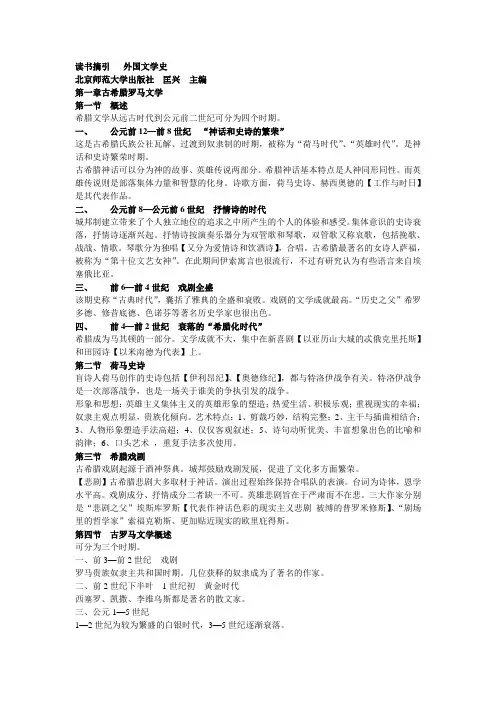
读书摘引外国文学史北京师范大学出版社匡兴主编第一章古希腊罗马文学第一节概述希腊文学从远古时代到公元前二世纪可分为四个时期。
一、公元前12—前8世纪“神话和史诗的繁荣”这是古希腊氏族公社瓦解、过渡到奴隶制的时期,被称为“荷马时代”、“英雄时代”。
是神话和史诗繁荣时期。
古希腊神话可以分为神的故事、英雄传说两部分。
希腊神话基本特点是人神同形同性。
而英雄传说则是部落集体力量和智慧的化身。
诗歌方面,荷马史诗、赫西奥德的【工作与时日】是其代表作品。
二、公元前8—公元前6世纪抒情诗的时代城邦制建立带来了个人独立地位的追求之中所产生的个人的体验和感受。
集体意识的史诗衰落,抒情诗逐渐兴起。
抒情诗按演奏乐器分为双管歌和琴歌,双管歌又称哀歌,包括挽歌、战战、情歌。
琴歌分为独唱【又分为爱情诗和饮酒诗】,合唱。
古希腊最著名的女诗人萨福,被称为“第十位文艺女神”。
在此期间伊索寓言也很流行,不过有研究认为有些语言来自埃塞俄比亚。
三、前6—前4世纪戏剧全盛该期史称“古典时代”,囊括了雅典的全盛和衰败。
戏剧的文学成就最高。
“历史之父”希罗多德、修昔底德、色诺芬等著名历史学家也很出色。
四、前4—前2世纪衰落的“希腊化时代”希腊成为马其顿的一部分。
文学成就不大,集中在新喜剧【以亚历山大城的忒俄克里托斯】和田园诗【以米南德为代表】上。
第二节荷马史诗盲诗人荷马创作的史诗包括【伊利昂纪】、【奥德修纪】,都与特洛伊战争有关。
特洛伊战争是一次部落战争,也是一场关于谁美的争执引发的战争。
形象和思想:英雄主义集体主义的英雄形象的塑造;热爱生活、积极乐观;重视现实的幸福;奴隶主观点明显,贵族化倾向。
艺术特点:1、剪裁巧妙,结构完整;2、主干与插曲相结合;3、人物形象塑造手法高超;4、仅仅客观叙述;5、诗句动听优美、丰富想象出色的比喻和韵律;6、口头艺术,重复手法多次使用。
第三节希腊戏剧古希腊戏剧起源于酒神祭典。
城邦鼓励戏剧发展,促进了文化多方面繁荣。
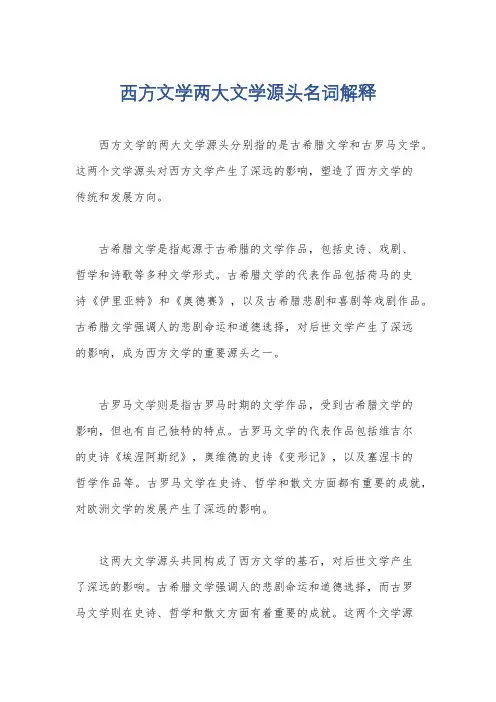
西方文学两大文学源头名词解释
西方文学的两大文学源头分别指的是古希腊文学和古罗马文学。
这两个文学源头对西方文学产生了深远的影响,塑造了西方文学的
传统和发展方向。
古希腊文学是指起源于古希腊的文学作品,包括史诗、戏剧、
哲学和诗歌等多种文学形式。
古希腊文学的代表作品包括荷马的史
诗《伊里亚特》和《奥德赛》,以及古希腊悲剧和喜剧等戏剧作品。
古希腊文学强调人的悲剧命运和道德选择,对后世文学产生了深远
的影响,成为西方文学的重要源头之一。
古罗马文学则是指古罗马时期的文学作品,受到古希腊文学的
影响,但也有自己独特的特点。
古罗马文学的代表作品包括维吉尔
的史诗《埃涅阿斯纪》,奥维德的史诗《变形记》,以及塞涅卡的
哲学作品等。
古罗马文学在史诗、哲学和散文方面都有重要的成就,对欧洲文学的发展产生了深远的影响。
这两大文学源头共同构成了西方文学的基石,对后世文学产生
了深远的影响。
古希腊文学强调人的悲剧命运和道德选择,而古罗
马文学则在史诗、哲学和散文方面有着重要的成就。
这两个文学源
头的作品和思想为西方文学的发展奠定了坚实的基础,成为后世文学创作的重要参照和借鉴对象。
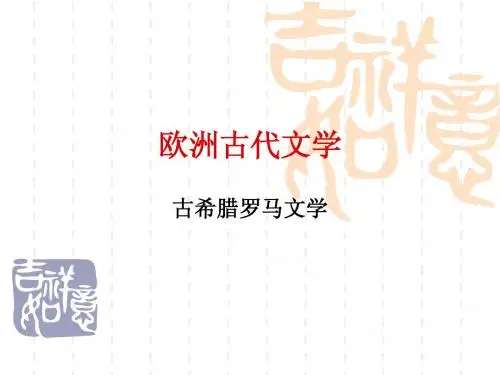
1.欧洲古代文学包括古希腊文学和古罗马文学。
古希腊古罗马文学反映了欧洲从氏族社会向奴隶制社会过渡时期的现实生活,特别是对古代的战争与和平、人与自然搏斗的英雄行为、社会历史的重大变迁等,表现得尤为深刻,因而具有丰富的历史文献价值。
2.古希腊文学经历了哪些阶段?①氏族公社制向奴隶制过渡时期(公元前12-8世纪),史称荷马时代,主要成就是神话和史诗②希腊奴隶制城邦国家的形成和繁荣时期(公元前8-5世纪),主要成就是抒情诗和寓言。
③希腊奴隶制全盛时期(公元前6末-4初世纪),史称古典时期,雅典成为全希腊的中心,文学艺术极度繁荣,主要成就是戏曲、散文、文艺理论。
④希腊化时期(公元前4-公元2世纪),文学成就不大,新喜剧对后代文学有一定的影响。
3.希腊神话包括哪两方面,有哪些特点?为什么说它是希腊文化的“武库”和“土壤”?⑴希腊神话主要包括神的故事和英雄传说两大部分;⑵希腊神话的特点为:①具备了人类的思想感情和人类特征,与其他民族的神话不同,希腊神话中的神既不是抽象道德的化身,也不是阴森怪诞令人畏惧的偶像,和人类一样,他们有感情,有爱、有恨、有嫉妒、有七情六欲,并不是高高在上、高不可攀,他们常常来到人间,与人间美丽的女子和男子相爱,但他们也有与凡人不一样的地方,那就是他们可以长生不老,有着神的智慧和神力。
②与其他民族一样,相信神、相信命运,有的神话故事与宗教祭祀紧密联系,但希腊神话更肯定的是人们的力量和人的奋斗精神,强调对人生与现实的热烈追求。
因此,充满着乐观主义精神,在某种意义上来讲,希腊神话更像是“人话”。
③希腊神话在世界神话中保存得最为完整,因而内容非常丰富。
⑶希腊神话的地位和影响是无可比拟的,其思想性和艺术性都达到了相当的高度。
希腊神话不仅对古希腊文学艺术的发展有很大的作用,而且对欧洲文学艺术的发展产生了深远影响。
因为希腊文化的各个方面,无论是美术、诗歌还是戏剧,无不渗透着希腊神话的气息,希腊神话既是希腊文化的素材也是创作形式,所以说腊神话是希腊文化的“武库”和“土壤”。
古代希腊罗马文学讲解古代希腊罗马文学第一节古代希腊文学概述一、历史发展及文学分期1、古希腊的地理位置古希腊包括巴尔干半岛Balkan peninsula (希腊半岛)南部、克里特岛、小亚细亚西岸(今土耳西部)、爱琴海中的许多岛屿。
2、古希腊文化特征(1)与海洋和岛屿的地理环境相关:第一,生产与贸易。
农业是古希腊人的主要生存方式,同时他们也注重商业的发展。
第二,土地与航海。
土地和海洋都是他们重要的生活依据。
第三,居住与流动。
他们既期望安稳,又渴望流动。
第四,和平与战争。
他们既重视和平,又不断依靠掠夺和扩张为自己积累财富。
(2)历史童年期。
也就是说,古希腊文化具有人类文明初期的一些特点:第一,神话与传说是古希腊人的一般观念和特别观念。
古希腊人常把神话和传说当作事实或真实的历史来看待。
古希腊人命运观的内涵:古希腊人对命运的无可奈何。
他们认为命运是一种外在的力量安排的,不以人的意志为转移。
?古希腊人具有顽强的探索命运的精神。
古希腊人敢于反抗命运的安排。
当命运降临时,他们勇于承担。
古希腊的神话和传说不是散乱、不连贯的,而是形成了比较完整的体系,形成了严密而清晰的神谱。
古希腊的神是有家族谱系的,具有人的特点。
(3)古希腊的哲学精神。
第一,各种学说的发达。
第二,思辨的理性能力。
古希腊哲学更具概念、推理等理性的特点,而不同于东方哲学侧重领悟、体验的方式。
第三,“逻各斯”。
“逻各斯”的内涵很丰富,主要指逻辑关系。
它不仅涉及对宇宙发展规律的原因的永恒探索,而且涉及对现实中的空间、时间以及自然界各种因果关系的追寻。
3、古希腊的历史发展古希腊文化的前身:称克里特-迈锡尼文明(Crete Mycenae Civilization )克里特文明,又称爱琴文明(Aegean Civilization):公元前2600-前1400年。
最早产生于克里特岛,因其处于欧亚非交汇点,故渐至繁荣。
新石器时代,小亚细亚人渡海至克里特,前3000年已进化至使用铜器和武器;前2000年进入青铜时代,出现了欧洲最早的奴隶制国家。
A brief introduction of ancient Greek- Rome literature10英语师范1班钱婉萍100206124 We regard ancient Greek and Roman literature as the treasure in the human culture. It really makes a difference in various aspects of the society; in philosophy, in science, in art and architecture and so on. They also play a vital part in the Renaissance in Italy and other European countries. Thanks to the ancient Greek and Roman literature, we have the chance appreciate the Homer, the lyric poetry and enjoy the drama.Ancient thinkers wrote verse about what they observed in nature. They are generally referred to as Pre-Socratic Philosophers. Many aspects of culture were still without distinct form then, during the Archaic Age of Ancient Greece. The origin of drama is the legend, but to the best of our information, drama seems to have arisen as part of religious worship and the word tragedy appears to come from the word goat song.Ancient Greek society placed considerable emphasis upon literature. Many authors consider the western literary tradition to have begun with the epic poems. The Iliad and The Odyssey, which remain giants in the literary canon for their skillful and vivid depictions of war and peace, honor and disgrace, love and hatred. Notable among later Greek poets was Sappho, who defined, in many ways, lyric poetry as a genre. A playwright named Aeschylus changed Western literature forever when he introduced the ideas of dialogue and interacting characters to playwriting. In doing so, he essentially invented "drama": his trilogy of plays is seen as his crowning achievement. Other refiners of playwriting were Sophocles and Euripides. Sophocles is credited with skillfully developing irony as a literary technique; most famously in his play Oedipus the King. Euripides, conversely, used plays to challenge societal norms and mores—a hallmark of much of Western literature for the next 2,300 years and beyond—and his works such as Medea. Philosophy entered literature in the dialogues of Plato, who converted the give and take of Socratic questioning into written form. Aristotle, Plato's student, wrote dozens of works on many scientific disciplines, but his greatest contribution to literature was likely his Poetics, which lays out his understanding of drama, and thereby establishes the first criteria for literary criticism. Greek mythology consists of stories belonging to the ancient Greeks concerning their gods and heroes, the nature of the world and the origins and significance of their religious practices. The main Greek gods were the twelve Olympians, Zeus, his wife Hera, Poseidon, Ares, Hermes, Hephaestus, Aphrodite, Athena, Apollo, Artemis, Demeter, and Dionysus. Other important deities included Hebe, Hades, Helios, Hestia, Persephone and Heracles. Greek mythology is explicitly embodied in a large collection of narratives, and implicitly in Greek representational arts, such as vase-paintings and votive gifts. Greek myth attempts to explain the origins of the world, and details the lives and adventures of a wide variety of gods, goddesses, heroes, heroines, and mythological creatures. These accounts initially were disseminated in an oral-poetic tradition; today the Greek myths are known primarilyfrom Greek literature.Let’s take some famous literary works for example. The oldest known Greek literary sources, Homer's epic poems Iliad and Odyssey, focus on events surrounding the Trojan War. Two poems by Homer's near contemporary Hesiod, the Theogony and the Works and Days, contain accounts of the genesis of the world, the succession of divine rulers, the succession of human ages, the origin of human woes, and the origin of sacrificial practices. Myths are also preserved in the Homeric Hymns, in fragments of epic poems of the Epic Cycle, in lyric poems, in the works of the tragedians of the fifth century BC, in writings of scholars and poets of the Hellenistic Age, and in texts from the time of the Roman Empire by writers such as Plutarch and Pausanias.In Northern Europe, Greek mythology never took the same hold of the visual arts, but its effect was very obvious on literature. The English imagination was fired by Greek mythology starting with Chaucer and John Milton and continuing through Shakespeare to Robert Bridges in the 20th century. Although during the Enlightenment of the 18th century reaction against Greek myth spread throughout Europe, the myths continued to provide an important source of raw material for dramatists, including those who wrote the libretti for many of Handel's and Mozart's operas. By the end of the 18th century, Romanticism initiated a surge of enthusiasm for all things Greek, including Greek mythology. In Britain, new translations of Greek tragedies and Homer inspired contemporary poets (such as Alfred Lord Tennyson, Keats, Byron and Shelley) and painters (such as Lord Leighton and Lawrence Alma-Tadema). Christoph Gluck, Richard Strauss, Jacques Offenbach and many others set Greek mythological themes to music. American authors of the 19th century, such as Thomas Bulfinch and Nathaniel Hawthorne, held that the study of the classical myths was essential to the understanding of English and American literature. In more recent times, classical themes have been reinterpreted by dramatists Jean Anouilh, Jean Cocteau, and Jean Giraudoux in France, Eugene O'Neill in America, and T. S. Eliot in Britain and by novelists such as James Joyce and André Gide Ancient Roman culture inherited something from the ancient Greek culture and gradually developed. Many Greek works have been introduced to Roman in the early times and later were translated and imitated In BC146, after Roman invaded Greek, all the Greek myth, poem and drama have been integrated into the Roman literature .The Roman made the Greek slaves the tutor, let them create poem and drama, as a result, ancient Roman literature has much to do with ancient Greek culture. However, the Roman literature is not equal to Greek literature, it is the product of the Roman society after all, it used the Latin as the major language to create the new culture .Compared with the Greek literature, Roman literature has more rational spirit and solemn quality. It pay more attention to the balance and harmony of the works .It also focus on the further polished to make the works.Ancient Greek -Rome literature is the mirror of the social life, they set up the basic of the literature to reflect life, is the origin of realistic. Polytheism conceived a wide range of fantasy, such as Symbol and metaphor expressions, the pursuit of freedom and emotion, and write the deification of God, make full use of the tendency in ancient Greek and Roman literature, opened the way to romanticism.Ancient Greece and Rome put forward the literary works of literature produced in the initial concept; it has a better understanding of the nature and the classification of the literature, affecting the later literary trends, ideas in Europe. In ancient Greek and Roman literature, the reflection of the concept of people, as well as a series of binary oppositions and it throughout the spirit of European Literature。